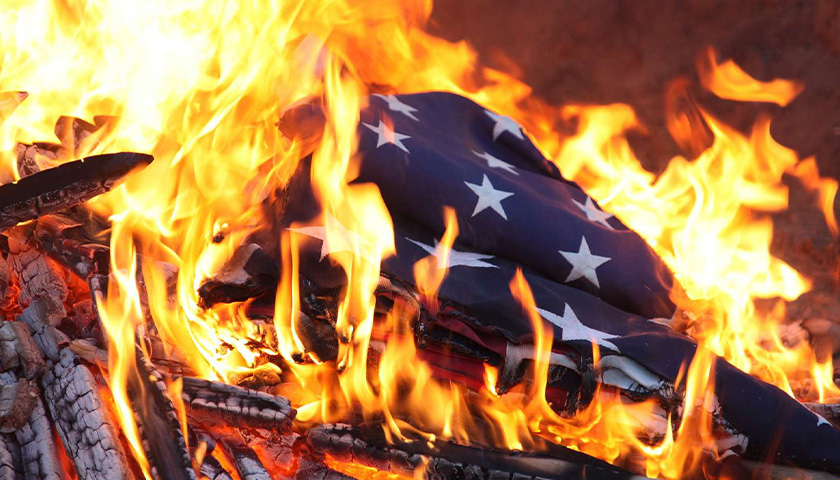by Malcolm Pollack
It’s obvious to all, at this point, that factional division is reaching a breaking point in America. Like a pair of locked-together tectonic plates pulling slowly in opposite directions, the strain has been increasing for a long time now – and when seismic ruptures finally occur, they happen suddenly, and release enormously destructive energies.
Some years back, John Derbyshire referred to this pent-up tension as a “cold civil war,” and here in 2020 more and more of us are getting the feeling that the term is apt. Is it? (The question has also been the subject of an ongoing weekly discussion between the radio host John Batchelor and historian Michael Vlahos.)
Scholars have argued over the nature of civil wars since the Romans first gave us the term. As described in David Armitage’s fascinating book Civil War: A History in Ideas, they have settled, over time, on a three-way taxonomy:
Secessionist: Civil wars are those in which one part of a nation wishes to separate itself and go its own way. Both of the wars fought on American soil, it could be argued, fall into this category: not only the one we now call “the Civil War,” but also the one we proudly refer to as the American Revolution.
Successionist: Civil wars are conflicts in which factions vie for control of a nation’s political system. In these conflicts the form of the nation is not at issue, just who shall occupy the throne. History is rich with examples.
Supersessionist: Civil wars are those in which two factions, with incompatible visions of what the form of the nation should be, vie for sovereignty over the nation’s territory. The French and Russian revolutions were of this type.
Throughout history, civil war has been regarded as uniquely evil. It pits neighbor against neighbor and brother against brother. It is the form of war in which, no matter who wins, the nation loses. Charles de Gaulle once said, “All wars are bad . . . But civil wars, in which there are brothers in both trenches, are unforgivable because peace is not born when war concludes.” Montaigne said, “Civill warres have this one thing worse than other warres, to cause every one of us to make a watch-tower of his owne house.”
One of the peculiarities of civil war is that it is hard to say, except in retrospect, when a nation has passed the point of no return. There is rarely anything so distinct as Caesar’s fateful crossing of the Rubicon. It is, rather, like falling into a black hole: there is an “event horizon,” at some distance from the singularity, beyond which nothing can escape. To a space-traveler falling through it, there is no visible difference, no noticeable boundary – but once you have crossed that fateful border, there’s no possibility of turning back. All future timelines must pass through the singularity.
Is that where we are today? For the answer to be “no” means either that one side in this great political conflict will simply admit defeat, or that there will be some softening of grievances, some sort of coming together in a newly formed political center. Does that seem likely?
Looking at the yawning rift in American politics – the fundamentally incompatible visions of society and government that the two factions hold, the dehumanizing mutual antipathy that finds freer expression every day, the unforgettable damage already done, and the implacable fury with which they grapple for every atom of power – can any of us imagine some way forward in which Right and Left just “bury the hatchet” and “hug it out”?
Which Way America?
Comity requires a minimum of commonality – but the social and political axioms of “blue” and “red” have moved so far apart as to be wholly incommensurate. Even the most basic axiom of all – that the United States of America, for all its flaws, is essentially good and worth preserving – is now the subject of acrid, even violent, disagreement. (Our nation’s “newspaper of record” has even gone out of its way to insist that the premise is not debatable, but false.)
If we have crossed the event horizon, then what sort of singularity – which of the three forms of civil war – are we falling toward?
Although the 2020 election will be bitterly contested – it may even turn out, in retrospect, to have been the singularity itself – the stakes here are much larger than who gets to spend the next four years in the White House. No matter who wins, the underlying strain will only increase. (Indeed, it will probably increase sharply: if you think things are tense in America now, just wait till mid-November or so.) If civil war is coming, then, it isn’t of the “successionist” variety.
Will the conflict be of the “secessionist” type? Alas, no. Would that it were!
If we look at the current state of American affairs as a failed marriage, the best solution would be some sort of divorce. A secessionist solution might very well be welcomed by all, and avoid civil war altogether. The problem, though, is that, unlike our previous civil war, the two sides do not occupy distinct and contiguous geographical regions, but are, rather, mixed together county by county, or even house by house. Nobody has yet arrived at any plausible plan for the factions to disaggregate – and without physical separation, it is hard to imagine a realistic means of political separation.
That leaves the “supersessionist” type, which seems closest to the mark.
An Existential Fight
“Red” and “blue” have profoundly different visions of the scope and structure of the federal government, and of the role of government in American life generally. They differ also on fundamental questions of religion, ethics, morals, and even human nature. Red believes that the American founding was a work of astonishing insight and inspiration and that it represents the best compromise yet struck by the minds of men to enable the possibility of ordered liberty and the individual citizen’s pursuit of happiness and prosperity.
Blue seems to believe increasingly that the whole thing was a sinister power-grab by a cadre of rich white males, designed to preserve and consolidate their immoral supremacy, and that the whole thing is so rotten that it should be torn up by its roots and replaced with something fairer and nobler. (Blue has already revealed that it wishes to see the Second Amendment, the Senate, the Electoral College, and our nation’s borders abolished – and its grievances hardly end there.)
We are fighting, then, not over who shall rule over the existing system, nor about whether the United States should be broken up into two distinct nations, but about whether the United States as currently constituted should continue to exist, or should be wholly replaced with an entirely new regime.
Yes, the idea of civil war is always repugnant. But there is another form of conflict that is very closely related to civil war – indeed they are often quite the same thing – that has exactly the opposite emotional polarity, and is especially well-related to civil wars of the supersessionist type: revolution.
Consider the difference. As David Armitage reminds us, “Civil wars, by the conventional understanding, betoken the blighting and collapse of the human spirit, while revolutions affirm and actualize it.” Civil war is a sickening thing, a noisome evil – but revolution is something to stir the heart, a pathway to fame and glory. (That the latter is so often just what the victors later call the former is quite beside the point.)
A Narrowing Presentism
A characteristic of revolutions is that they rupture the fabric of history. In periods of high civilization, however, that fabric is strong: healthy societies exist not only in the present, but extend both backward and forward in time. The citizens of a robust and prosperous polity are taught from childhood to have a reverent appreciation for what their ancestors have bequeathed them, and a sense of duty to preserve, cherish, and build upon it for generations yet unborn. (Just so was my own generation raised, long ago in mid-20th-century America.)
To rupture that fabric is far easier when it is already weakened – and this is precisely what has happened in America, and in the West more generally, over the past half-century. Insofar as the American past is taught or remembered at all today, it is as a litany of sins, deserving not propagation, but denunciation. The result is that American culture has, to a very great extent, lost its extension in time, and exists in an increasingly narrow present.
Roger Kimball has called this, in a lovely coinage, “temporal provincialism.” We might also call it historical “stenosis”: a pathological narrowing of the channels through which the life-blood of the past flows into the present and the future. And in the sense that the present is always being born from the womb of history, it brings to mind the tying off of an umbilicus – though that is really far too optimistic a metaphor. A better one is the cutting of a flower.
This narrowing presentism tears at a fundamental requirement of civilization: that its citizens see themselves as a living bridge between past and future. If the past is rejected or forgotten, then we have no estate to bequeath to posterity, other than what we can build, ex nihilo, in the present. To create a viable nation from scratch, however, is a daunting task, and one that rarely succeeds. Revolution may make for an exhilarating present, but it destabilizes the future.
Civilization depends also on high “time preference”: we defer present consumption to profit from the increased relative value of the things we build for the future. But too-rapid technological and social changes, and of course the deliberate obliteration of history, work to diminish confidence in the surety of the future and drive time-preference toward the present. This in turn manifests itself in hedonism, anomie, present consumption, loss of social cohesion (why pull together when there’s nothing to pull for?), and declining birth rates. This all feeds back upon itself in an intensifying, destructive cycle.
These are dangerous times. Civil war is nothing to wish for. But under the name of “revolution,” it can be a powerful attractor, especially in an era of pathological presentism. Have we already crossed the event horizon? Can we, for the sake of our children’s children, find at the last moment a way to reverse course, to step back from the brink, to find a future timeline that avoids the dreadful singularity of civil war? Only future historians can answer that question. But one thing is certain: things that are falling tend to accelerate. Time is short.
– – –
Malcolm Pollack is a recording engineer and writer living in Wellfleet, Massachusetts. He blogs at malcolmpollack.com. Follow him on Twitter: @mtpollack.
Photo “Tattered Flag” by David Shankbone CC2.0.






Mr. Pollock, very well written and thought provoking. I would side with the theory that we are on the doorstep of an attempted revolution, not a civil war. The Right represents the status-quo, and the Left backed by the global scourge of Socialism is attempting to take over America. We are already witnessing their violent attempts as well as finally seeing push back from Constitutional Americans. Short of the Second Coming, civil conflict on a much greater scale appears to be inevitable. The aggressors are not going to stop their attacks, and after the president is reelected the violence will escalate dramatically. At that point the federal government will be forced to step in to quell the violence with mass arrests and thousands of insurrectionists being sent to internment camps. America will be in the midst of a full blown uncivil conflict and at this point I wouldn’t be surprised if either the UN or the communist Chinese invade our shores.
It is blatantly obvious that there are global entities exerting extreme pressure on the Democratic Party and funding the current violence. Some argue that it is because President Trump would not pay homage to the these globalist and they are now attempting to destroy America. The hour is fast approaching and very troubling times are on the horizon.
The author might benefit from considering how we got to this point. While we are still a country, we are no longer a nation, as in the Latin root natio, one people. The affinity by which people can be bound may be ethnicity, culture, a common aspiration, or even a common enemy, but in the absence of at least one such factor, we are no longer a nation. There was a time when we were one people, under God. No longer. One can trace the decline back to the Wilson era. Mussolini found much of his fascist inspiration from Wilson. Hitler, in turn, got much of his inspiration from Mussolini. FDR admired much of what both were doing.
The most obvious alternative to armed conflict and civil unrest is for the states to assert their rights under the U.S. Constitution, in particular to reduce the size of the Federal beast by limiting it according to the enumerated powers.
For the people of those states to look within for solutions to the problems that are unique to their sociopolitical demographic structure, rather than the central government and its “free money” – no such thing, everything has a price.
Review their own state constitutions, and that of other states, and decide which most closely matches their values and beliefs. Look at the composition and recent deliberations of those state legislatures, look at the degree of agreement or conflict within those deliberations. Are the arguments consistent with the state constitution, sound, considered and largely borne of reason, or emotional outbursts, and bellicose?
The divide within each state is largely along an urban/rural divide. Portland Oregon is much in the news these days, but if you look at the 36 counties that comprise the state, you will see just how stark that divide is. The population center of Multnomah county drives the rest of the state, but most certainly does not represent their values writ large. It is mob rule at its worst. The Republican members of the legislature recently had to flee the state in order to prevent a quorum on an issue before the super-majority Communist legislature.
But all of that takes effort, and people don’t want to expend the effort. Our Governor is proving himself a tyrant worthy of the name by perpetuating a contrived state of emergency, further destroying the economy of what was one of the more sound states fiscally speaking, so that the state is further reduced to a state of dependency. Dependent on the cabal of private financiers that is the Federal Reserve.
And, for all of that, the legislature is doing what, exactly, to reign him in? Some words, but no concrete action. Just look to the blowhards in a room and in most instances those are the individuals least likely to act. In sum, there is no voting our way out of this.
And this is only a sideshow, a useful distraction; the globalists aspire to the destruction of the nation state, and they have a plan, a plan to replace “shareholder capitalism with stakeholder capitalism”, which is to say the elimination of private property and profit, except for themselves, the worthy elite.
And they are executing that plan, in plain view: https://www.weforum.org/focus/the-great-reset.
May the chains rest lightly upon you.